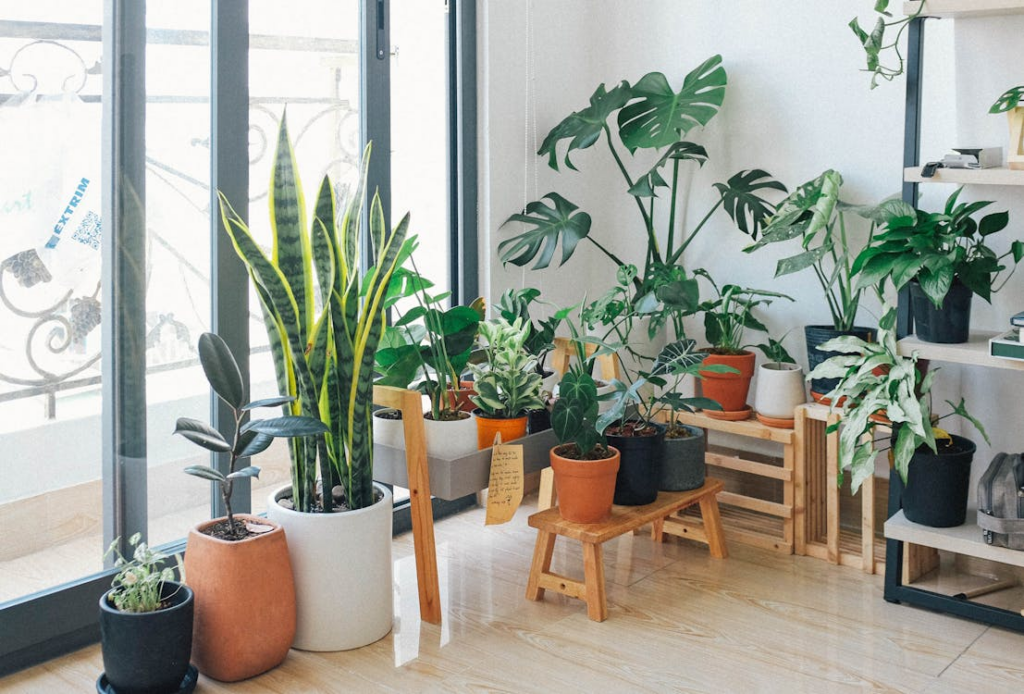While social media trends are infamous for being nothing more than fads, quickly fading into obscurity, indoor gardening has endured and surged with popularity, especially during the pandemic. Indoor gardening has continued to thrive among Millennials and Gen Z. Research has discovered that houseplants offer a host of scientifically supported benefits for mental and physical well-being, even beyond their aesthetic appeal. While there are a myriad of benefits of indoor plants, let’s focus on 7 specific benefits backed by science.
1. Indoor Plants Reduce Stress Levels

Research has consistently shown that having indoor plants and interacting with them can reduce stress levels. A study published in the Journal of Physiological Anthropology, the researchers gave participants two tasks: one group would complete a short computer-based task, the other group would be repotting a houseplant. Results showed that participants who repotted houseplants experienced reduced heart rates and blood pressure compared to those completing the computer-based task. This research pinpointed how gardening can reduce both physiological and mental stress. Additionally, simply being around plants can decrease cortisol, the body’s primary stress hormone.
2. Plants Sharpen Attention and Boost Cognitive Function

Indoor plants can help with focus and concentration, making them beneficial in classrooms and workspaces. A study involving 23 students from an elementary school put participants in a classroom with either fake plants, a photograph of a plant, a real one and none at all. They found that students exposed to real plants performed better on attention-related tasks compared to those surrounded by fake plants or no plants at all. Another review revealed that indoor plants positively influence cognitive functions such as memory retention and response time.
3. Indoor Gardening Offers Therapeutic Benefits

Horticultural therapy has been used for centuries to improve mental health. Currently, medical clinics in Manchester are “prescribing” potted plants to individuals dealing with anxiety, depression, or dementia. Researchers have discovered that caring for plants can promote feelings of well-being, purpose and help combat depression or anxiety symptoms for those who are suffering from these afflictions.
Read More: Study Shows Women Who Are Surrounded By Plants Are Happier And Live Longer
4. Plants Aid Recovery from Illness

The presence of plants can accelerate physical recovery from illness or surgery. Studies have shown that patients exposed to plants or natural views required less pain medication and had shorter hospital stays compared to those without access to such environments. While much of this research focuses on hospital settings, incorporating plants into home spaces may also contribute to faster healing by reducing stress and creating a soothing atmosphere.
5. Houseplants Enhance Productivity

Multiple studies show that adding plants to workspaces has been linked to increased productivity and creativity. For example, a study conducted in 2007 found that employees working in environments surrounded by plants reported higher job satisfaction and took fewer sick days off. Similarly, a study conducted in 1996 showed that students in a computer lab worked 12% faster when surrounded by plants. Office workers with plant-filled surroundings demonstrated improved problem-solving skills and creativity during brainstorming sessions.
6. Improved Air Quality Through Phytoremediation

Houseplants have long been celebrated for their ability to purify indoor air by removing volatile organic compounds (VOCs) like formaldehyde and benzene. Conducted in 1980, NASA’s study highlighted certain plant species’ benefits in removing and effectively filtering toxins from closed environments. However, recent research suggests that achieving significant air purification would require a large number of plants. While modern air filters may outperform houseplants in this regard, species like spider plants, Boston ferns, and rubber trees remain excellent choices for naturally improving air quality on a smaller scale.
7. Plants Promote Emotional Well-Being

The presence of indoor plants can elevate mood and promote a sense of happiness. Millennials and Gen Z have embraced houseplants not only as decorative elements but also as a way to animate their living spaces, bringing life into otherwise sterile environments.
Social media platforms like Instagram and TikTok have boosted this trend by influencers and users alike showcasing lush indoor gardens as symbols of self-care and creativity. The act of nurturing plants provides a sense of accomplishment and connection to nature, even in urban settings where outdoor greenery and plants may be scarce.
Choosing the Right Plants for Your Space

While the benefits of houseplants are undeniable, it’s important to do research and select the right varieties that suit your lifestyle and environment. For beginners or those with limited time, low-maintenance options like pothos or snake plants are ideal choices. Also, pet-owners should exercise caution in choosing houseplants, making sure they are not toxic to their pets.
Conclusion

Even though indoor gardening has garnered more support due to social media trends, it is more than a passing trend. It has become a lifestyle choice for many millennials or Gen Zers with a positive impact on health and well-being. From reducing stress levels to boosting productivity and improving air quality, houseplants offer numerous benefits backed by science. As urban living and expansion continue to dominate and infiltrate modern life, integrating plants into our homes provides a way to reconnect with nature while enhancing our physical and emotional health.
Read More: 4 Houseplants You Can Easily Propagate From Cuttings

